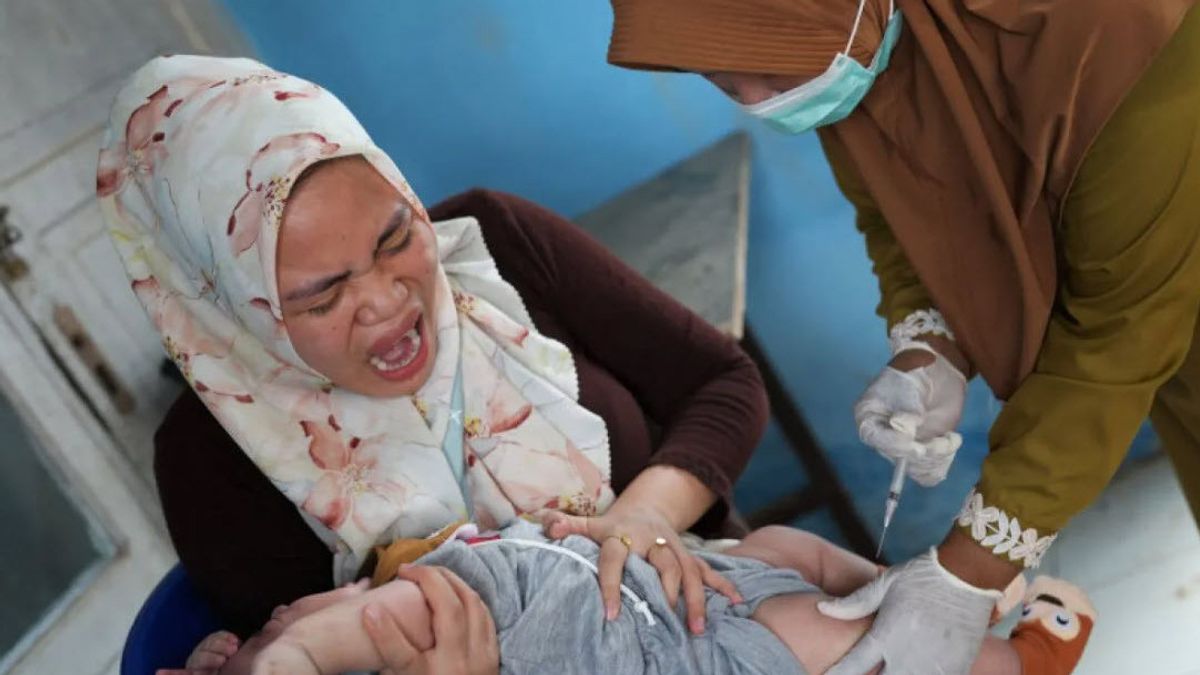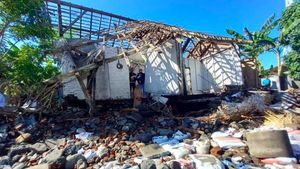JAKARTA – The spread of mumps to thousands of children in several regions in Indonesia according to experts is due to low vaccination coverage.
Epidemiologist from Airlangga University Windhu Purnomo said the disease which is transmitted through saliva splashes from the mouth and nose can be prevented by administering the measles, mumps, and rubella or MMR vaccine.
"If there are cases now, it means that the vaccination is not good, meaning the vaccination coverage is not good and the vaccination program in the area is not running well," said Windhu.
Not long ago, SMPN 8 South Tangerang (Tangsel) went viral after implementing a lockdown because many students had chickenpox and mumps.

Before the data on the number of children suffering from chickenpox and mumps came out, the school had given the children a day off to spray disinfectant throughout the school on October 14, 2024.
The Head of the Kranggan Health Center made an appeal letter to the school to carry out distance learning or PJJ for 14 days starting from October 17 to October 31, 2024.
Spread in Several Regions
Quoting the Indonesian Ministry of Health website, mumps is an infectious disease caused by a virus that attacks the parotid glands, which are saliva-producing glands located under the ears.
Mumps is caused by a virus from the paramyxovirus group, which is easily spread through droplets of saliva from coughing, sneezing, or direct contact with sufferers. Once the virus enters the body, it multiplies and triggers inflammation in the parotid.
This disease can cause serious complications, such as brain infections or even hearing loss, so it is important to understand the symptoms and preventive measures.
Mumps cases do not only occur in schools in South Tangerang. In Jakarta, 1,234 cases of mumps were recorded from January to June 2024. Similar cases were also reported in several schools in Bandung and Cimahi, West Java. In East Java, there was also a spread of this case with details of 2,001 cases in Malang Regency, 215 cases in Kediri City, 907 cases in Banyuwangi and 1,596 in Jombang.
In addition, mumps cases were also reported to have spread in Sorong City, Southwest Papua, when six children complained of swelling in the jaw accompanied by fever last September.
Mumps is categorized as an infectious disease. Mumps can spread when someone inhales saliva droplets when the sufferer coughs, sneezes, or talks. It can also be spread through direct contact such as kissing the sufferer.
"Mumps can be transmitted by touching a surface contaminated with the virus and then touching the nose or mouth," as quoted on the Ministry of Health website.
"In addition, this virus can be transmitted by sharing eating utensils with sufferers," he added.
Easily Transmitted
Public health practitioner Dr. Ngabila Salama said that mumps is easily transmitted so that children who are infected with the disease are asked to stay at home. Children can only return to activities such as school and playing with other children when they have recovered.
Ngabila explained that this disease can be declared cured if there are no more symptoms, either swelling in the neck or cheeks or jaw, and the cough and runny nose have stopped.
"If there are still symptoms of cough or runny nose or sore throat, it can still be transmitted to other people," said Ngabila.
The majority of mumps cases can also heal on their own, but this disease can cause complications that have serious consequences. Starting from viral infections in the brain to hearing loss.
Although it can be transmitted quickly, mumps can actually be prevented through MMR immunization. This vaccine is given twice to children, first at the age of 18 months and then repeated at the age of 5-7 years. Adults who have not been vaccinated are also advised to get the MMR vaccine, especially for those at high risk of exposure.
Seeing the mumps cases that caused schools in South Tangerang to be locked down, and also occurred in various regions in Indonesia, epidemiologist from Airlangga University, Windhu Purnomo, suspects that this happened because the vaccine coverage was not good.

"The disease is a disease that can be prevented by immunization or vaccination. If cases appear, it means that the vaccination program in that area is not running well," said Windhu.
Windhu added that the mumps disease that he had experienced as a child should not have reappeared if vaccination was carried out optimally.
The low vaccination coverage in several areas, said Windhu, is also influenced by the reluctance of parents to give their children complete vaccinations.
"The low vaccination coverage is also because there are parents who don't want to be vaccinated, there are still those who are anti-vaccine," said Windhu.
Windhu further explained that the dense population in urban areas also affects the spread of the virus. The density of the urban population makes mumps easily transmitted.
"In urban areas, the density is high. If one person gets it, everyone can get it," he said.
Meanwhile, when confirmed regarding the alleged low vaccination coverage, the Head of the Public Service Communication Bureau of the Ministry of Health (Kemenkes) Aji Muhawarman did not rule out this possibility, but he emphasized that it must be explained based on data.
The English, Chinese, Japanese, Arabic, and French versions are automatically generated by the AI. So there may still be inaccuracies in translating, please always see Indonesian as our main language. (system supported by DigitalSiber.id)













